HLT301 Semester 1: Mental State Evaluation Workbook for Healthcare
VerifiedAdded on 2022/08/15
|10
|2721
|19
Homework Assignment
AI Summary
This assignment is a mental state evaluation workbook, focusing on the assessment of a patient, Andy, presenting with symptoms of psychosis. It explores the process of mental state evaluation, its importance in nursing and midwifery, and the specific application to Andy's case. The assignment delves into Andy's appearance, behavior, speech, and identified symptoms of psychosis, differentiating between mood and affect. It analyzes potential tests, and how a doctor might document findings, as well as assessing Andy's insight into his condition and associated risks. The assignment concludes by outlining appropriate interventions, treatment pathways, and care settings for Andy, including pharmacological and therapeutic approaches. The student has provided comprehensive answers to each of the questions in the workbook, demonstrating a strong understanding of mental health assessment and patient care.
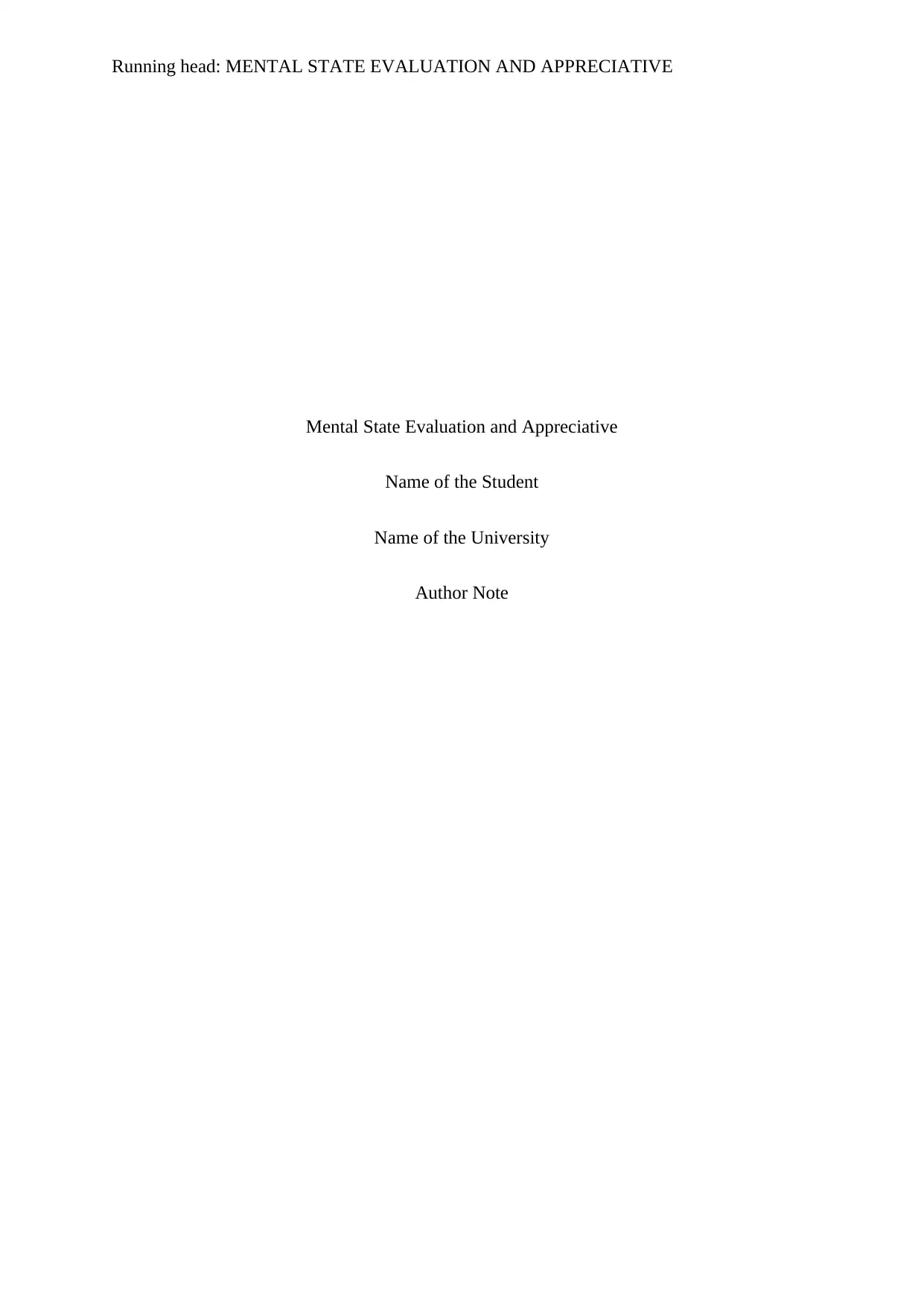
Running head: MENTAL STATE EVALUATION AND APPRECIATIVE
Mental State Evaluation and Appreciative
Name of the Student
Name of the University
Author Note
Mental State Evaluation and Appreciative
Name of the Student
Name of the University
Author Note
Paraphrase This Document
Need a fresh take? Get an instant paraphrase of this document with our AI Paraphraser
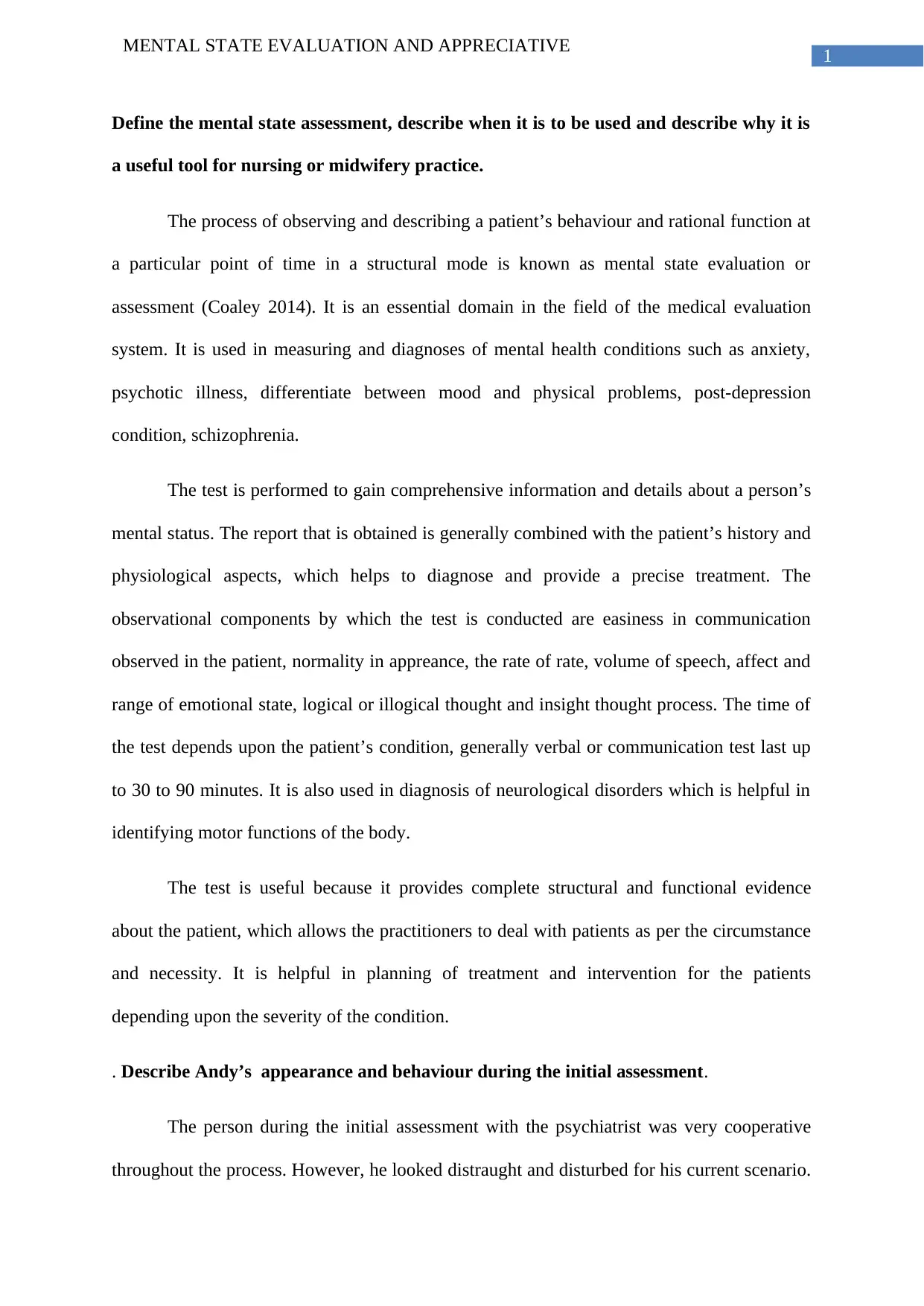
1
MENTAL STATE EVALUATION AND APPRECIATIVE
Define the mental state assessment, describe when it is to be used and describe why it is
a useful tool for nursing or midwifery practice.
The process of observing and describing a patient’s behaviour and rational function at
a particular point of time in a structural mode is known as mental state evaluation or
assessment (Coaley 2014). It is an essential domain in the field of the medical evaluation
system. It is used in measuring and diagnoses of mental health conditions such as anxiety,
psychotic illness, differentiate between mood and physical problems, post-depression
condition, schizophrenia.
The test is performed to gain comprehensive information and details about a person’s
mental status. The report that is obtained is generally combined with the patient’s history and
physiological aspects, which helps to diagnose and provide a precise treatment. The
observational components by which the test is conducted are easiness in communication
observed in the patient, normality in appreance, the rate of rate, volume of speech, affect and
range of emotional state, logical or illogical thought and insight thought process. The time of
the test depends upon the patient’s condition, generally verbal or communication test last up
to 30 to 90 minutes. It is also used in diagnosis of neurological disorders which is helpful in
identifying motor functions of the body.
The test is useful because it provides complete structural and functional evidence
about the patient, which allows the practitioners to deal with patients as per the circumstance
and necessity. It is helpful in planning of treatment and intervention for the patients
depending upon the severity of the condition.
. Describe Andy’s appearance and behaviour during the initial assessment.
The person during the initial assessment with the psychiatrist was very cooperative
throughout the process. However, he looked distraught and disturbed for his current scenario.
MENTAL STATE EVALUATION AND APPRECIATIVE
Define the mental state assessment, describe when it is to be used and describe why it is
a useful tool for nursing or midwifery practice.
The process of observing and describing a patient’s behaviour and rational function at
a particular point of time in a structural mode is known as mental state evaluation or
assessment (Coaley 2014). It is an essential domain in the field of the medical evaluation
system. It is used in measuring and diagnoses of mental health conditions such as anxiety,
psychotic illness, differentiate between mood and physical problems, post-depression
condition, schizophrenia.
The test is performed to gain comprehensive information and details about a person’s
mental status. The report that is obtained is generally combined with the patient’s history and
physiological aspects, which helps to diagnose and provide a precise treatment. The
observational components by which the test is conducted are easiness in communication
observed in the patient, normality in appreance, the rate of rate, volume of speech, affect and
range of emotional state, logical or illogical thought and insight thought process. The time of
the test depends upon the patient’s condition, generally verbal or communication test last up
to 30 to 90 minutes. It is also used in diagnosis of neurological disorders which is helpful in
identifying motor functions of the body.
The test is useful because it provides complete structural and functional evidence
about the patient, which allows the practitioners to deal with patients as per the circumstance
and necessity. It is helpful in planning of treatment and intervention for the patients
depending upon the severity of the condition.
. Describe Andy’s appearance and behaviour during the initial assessment.
The person during the initial assessment with the psychiatrist was very cooperative
throughout the process. However, he looked distraught and disturbed for his current scenario.
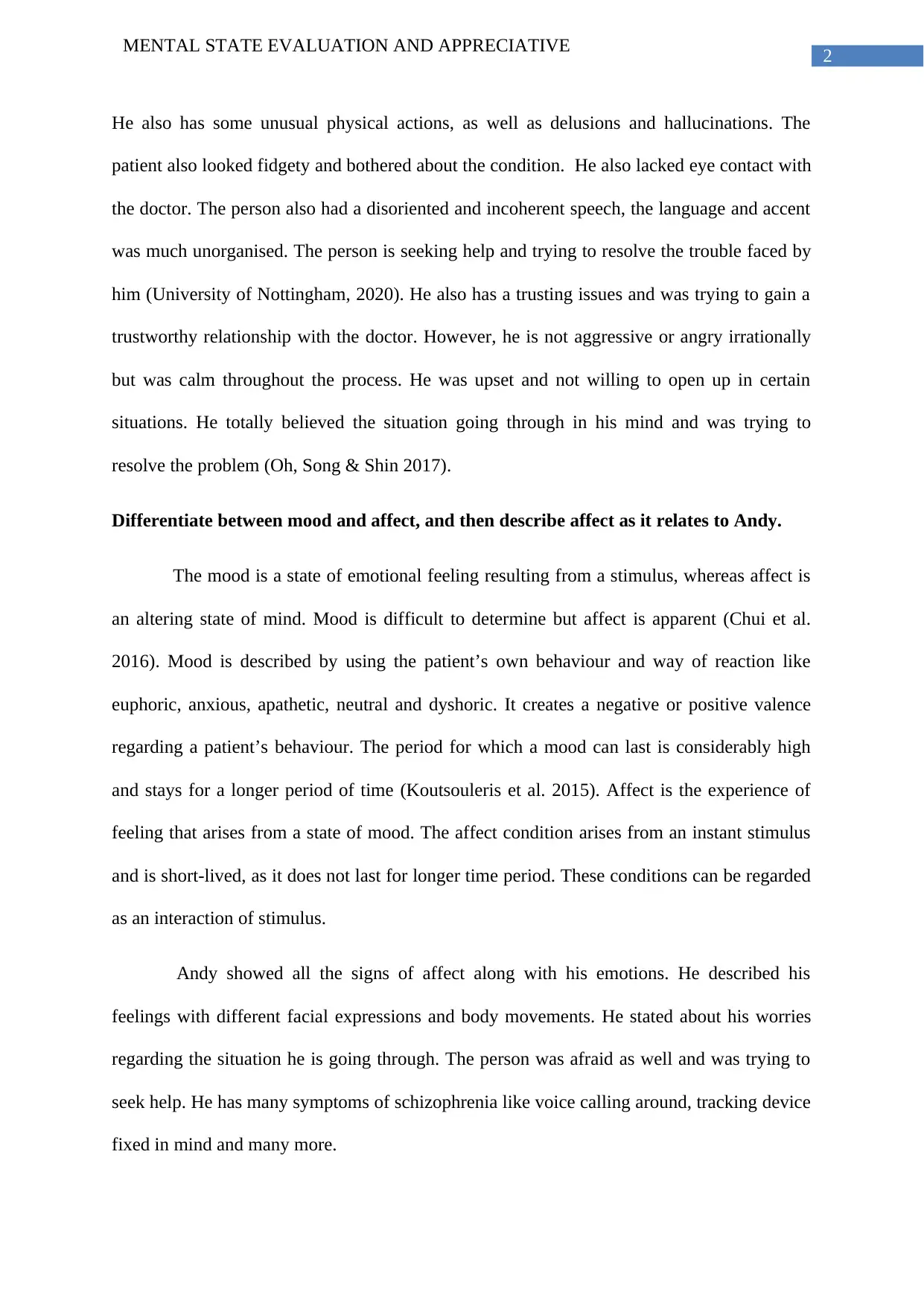
2
MENTAL STATE EVALUATION AND APPRECIATIVE
He also has some unusual physical actions, as well as delusions and hallucinations. The
patient also looked fidgety and bothered about the condition. He also lacked eye contact with
the doctor. The person also had a disoriented and incoherent speech, the language and accent
was much unorganised. The person is seeking help and trying to resolve the trouble faced by
him (University of Nottingham, 2020). He also has a trusting issues and was trying to gain a
trustworthy relationship with the doctor. However, he is not aggressive or angry irrationally
but was calm throughout the process. He was upset and not willing to open up in certain
situations. He totally believed the situation going through in his mind and was trying to
resolve the problem (Oh, Song & Shin 2017).
Differentiate between mood and affect, and then describe affect as it relates to Andy.
The mood is a state of emotional feeling resulting from a stimulus, whereas affect is
an altering state of mind. Mood is difficult to determine but affect is apparent (Chui et al.
2016). Mood is described by using the patient’s own behaviour and way of reaction like
euphoric, anxious, apathetic, neutral and dyshoric. It creates a negative or positive valence
regarding a patient’s behaviour. The period for which a mood can last is considerably high
and stays for a longer period of time (Koutsouleris et al. 2015). Affect is the experience of
feeling that arises from a state of mood. The affect condition arises from an instant stimulus
and is short-lived, as it does not last for longer time period. These conditions can be regarded
as an interaction of stimulus.
Andy showed all the signs of affect along with his emotions. He described his
feelings with different facial expressions and body movements. He stated about his worries
regarding the situation he is going through. The person was afraid as well and was trying to
seek help. He has many symptoms of schizophrenia like voice calling around, tracking device
fixed in mind and many more.
MENTAL STATE EVALUATION AND APPRECIATIVE
He also has some unusual physical actions, as well as delusions and hallucinations. The
patient also looked fidgety and bothered about the condition. He also lacked eye contact with
the doctor. The person also had a disoriented and incoherent speech, the language and accent
was much unorganised. The person is seeking help and trying to resolve the trouble faced by
him (University of Nottingham, 2020). He also has a trusting issues and was trying to gain a
trustworthy relationship with the doctor. However, he is not aggressive or angry irrationally
but was calm throughout the process. He was upset and not willing to open up in certain
situations. He totally believed the situation going through in his mind and was trying to
resolve the problem (Oh, Song & Shin 2017).
Differentiate between mood and affect, and then describe affect as it relates to Andy.
The mood is a state of emotional feeling resulting from a stimulus, whereas affect is
an altering state of mind. Mood is difficult to determine but affect is apparent (Chui et al.
2016). Mood is described by using the patient’s own behaviour and way of reaction like
euphoric, anxious, apathetic, neutral and dyshoric. It creates a negative or positive valence
regarding a patient’s behaviour. The period for which a mood can last is considerably high
and stays for a longer period of time (Koutsouleris et al. 2015). Affect is the experience of
feeling that arises from a state of mood. The affect condition arises from an instant stimulus
and is short-lived, as it does not last for longer time period. These conditions can be regarded
as an interaction of stimulus.
Andy showed all the signs of affect along with his emotions. He described his
feelings with different facial expressions and body movements. He stated about his worries
regarding the situation he is going through. The person was afraid as well and was trying to
seek help. He has many symptoms of schizophrenia like voice calling around, tracking device
fixed in mind and many more.
⊘ This is a preview!⊘
Do you want full access?
Subscribe today to unlock all pages.

Trusted by 1+ million students worldwide
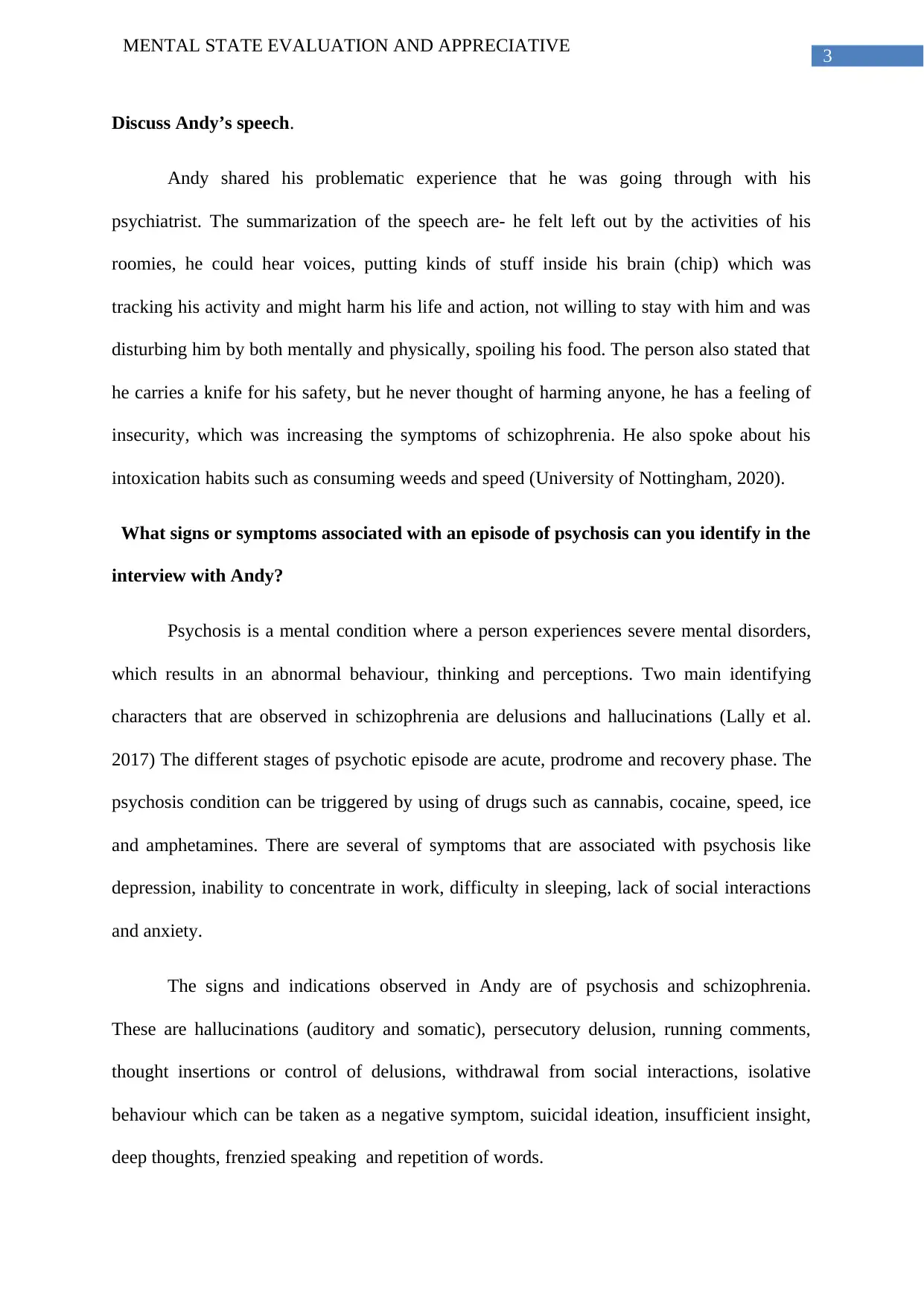
3
MENTAL STATE EVALUATION AND APPRECIATIVE
Discuss Andy’s speech.
Andy shared his problematic experience that he was going through with his
psychiatrist. The summarization of the speech are- he felt left out by the activities of his
roomies, he could hear voices, putting kinds of stuff inside his brain (chip) which was
tracking his activity and might harm his life and action, not willing to stay with him and was
disturbing him by both mentally and physically, spoiling his food. The person also stated that
he carries a knife for his safety, but he never thought of harming anyone, he has a feeling of
insecurity, which was increasing the symptoms of schizophrenia. He also spoke about his
intoxication habits such as consuming weeds and speed (University of Nottingham, 2020).
What signs or symptoms associated with an episode of psychosis can you identify in the
interview with Andy?
Psychosis is a mental condition where a person experiences severe mental disorders,
which results in an abnormal behaviour, thinking and perceptions. Two main identifying
characters that are observed in schizophrenia are delusions and hallucinations (Lally et al.
2017) The different stages of psychotic episode are acute, prodrome and recovery phase. The
psychosis condition can be triggered by using of drugs such as cannabis, cocaine, speed, ice
and amphetamines. There are several of symptoms that are associated with psychosis like
depression, inability to concentrate in work, difficulty in sleeping, lack of social interactions
and anxiety.
The signs and indications observed in Andy are of psychosis and schizophrenia.
These are hallucinations (auditory and somatic), persecutory delusion, running comments,
thought insertions or control of delusions, withdrawal from social interactions, isolative
behaviour which can be taken as a negative symptom, suicidal ideation, insufficient insight,
deep thoughts, frenzied speaking and repetition of words.
MENTAL STATE EVALUATION AND APPRECIATIVE
Discuss Andy’s speech.
Andy shared his problematic experience that he was going through with his
psychiatrist. The summarization of the speech are- he felt left out by the activities of his
roomies, he could hear voices, putting kinds of stuff inside his brain (chip) which was
tracking his activity and might harm his life and action, not willing to stay with him and was
disturbing him by both mentally and physically, spoiling his food. The person also stated that
he carries a knife for his safety, but he never thought of harming anyone, he has a feeling of
insecurity, which was increasing the symptoms of schizophrenia. He also spoke about his
intoxication habits such as consuming weeds and speed (University of Nottingham, 2020).
What signs or symptoms associated with an episode of psychosis can you identify in the
interview with Andy?
Psychosis is a mental condition where a person experiences severe mental disorders,
which results in an abnormal behaviour, thinking and perceptions. Two main identifying
characters that are observed in schizophrenia are delusions and hallucinations (Lally et al.
2017) The different stages of psychotic episode are acute, prodrome and recovery phase. The
psychosis condition can be triggered by using of drugs such as cannabis, cocaine, speed, ice
and amphetamines. There are several of symptoms that are associated with psychosis like
depression, inability to concentrate in work, difficulty in sleeping, lack of social interactions
and anxiety.
The signs and indications observed in Andy are of psychosis and schizophrenia.
These are hallucinations (auditory and somatic), persecutory delusion, running comments,
thought insertions or control of delusions, withdrawal from social interactions, isolative
behaviour which can be taken as a negative symptom, suicidal ideation, insufficient insight,
deep thoughts, frenzied speaking and repetition of words.
Paraphrase This Document
Need a fresh take? Get an instant paraphrase of this document with our AI Paraphraser
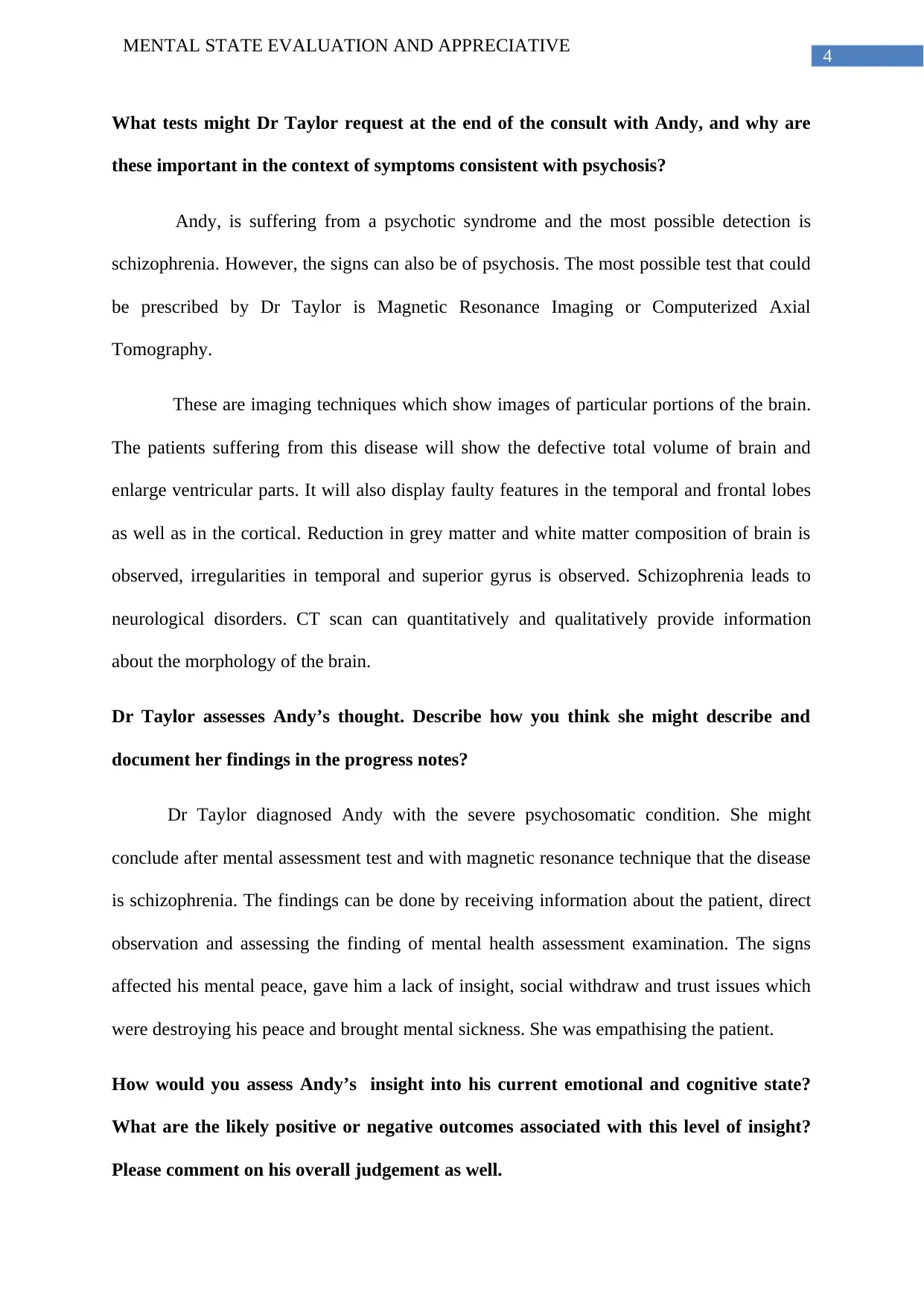
4
MENTAL STATE EVALUATION AND APPRECIATIVE
What tests might Dr Taylor request at the end of the consult with Andy, and why are
these important in the context of symptoms consistent with psychosis?
Andy, is suffering from a psychotic syndrome and the most possible detection is
schizophrenia. However, the signs can also be of psychosis. The most possible test that could
be prescribed by Dr Taylor is Magnetic Resonance Imaging or Computerized Axial
Tomography.
These are imaging techniques which show images of particular portions of the brain.
The patients suffering from this disease will show the defective total volume of brain and
enlarge ventricular parts. It will also display faulty features in the temporal and frontal lobes
as well as in the cortical. Reduction in grey matter and white matter composition of brain is
observed, irregularities in temporal and superior gyrus is observed. Schizophrenia leads to
neurological disorders. CT scan can quantitatively and qualitatively provide information
about the morphology of the brain.
Dr Taylor assesses Andy’s thought. Describe how you think she might describe and
document her findings in the progress notes?
Dr Taylor diagnosed Andy with the severe psychosomatic condition. She might
conclude after mental assessment test and with magnetic resonance technique that the disease
is schizophrenia. The findings can be done by receiving information about the patient, direct
observation and assessing the finding of mental health assessment examination. The signs
affected his mental peace, gave him a lack of insight, social withdraw and trust issues which
were destroying his peace and brought mental sickness. She was empathising the patient.
How would you assess Andy’s insight into his current emotional and cognitive state?
What are the likely positive or negative outcomes associated with this level of insight?
Please comment on his overall judgement as well.
MENTAL STATE EVALUATION AND APPRECIATIVE
What tests might Dr Taylor request at the end of the consult with Andy, and why are
these important in the context of symptoms consistent with psychosis?
Andy, is suffering from a psychotic syndrome and the most possible detection is
schizophrenia. However, the signs can also be of psychosis. The most possible test that could
be prescribed by Dr Taylor is Magnetic Resonance Imaging or Computerized Axial
Tomography.
These are imaging techniques which show images of particular portions of the brain.
The patients suffering from this disease will show the defective total volume of brain and
enlarge ventricular parts. It will also display faulty features in the temporal and frontal lobes
as well as in the cortical. Reduction in grey matter and white matter composition of brain is
observed, irregularities in temporal and superior gyrus is observed. Schizophrenia leads to
neurological disorders. CT scan can quantitatively and qualitatively provide information
about the morphology of the brain.
Dr Taylor assesses Andy’s thought. Describe how you think she might describe and
document her findings in the progress notes?
Dr Taylor diagnosed Andy with the severe psychosomatic condition. She might
conclude after mental assessment test and with magnetic resonance technique that the disease
is schizophrenia. The findings can be done by receiving information about the patient, direct
observation and assessing the finding of mental health assessment examination. The signs
affected his mental peace, gave him a lack of insight, social withdraw and trust issues which
were destroying his peace and brought mental sickness. She was empathising the patient.
How would you assess Andy’s insight into his current emotional and cognitive state?
What are the likely positive or negative outcomes associated with this level of insight?
Please comment on his overall judgement as well.
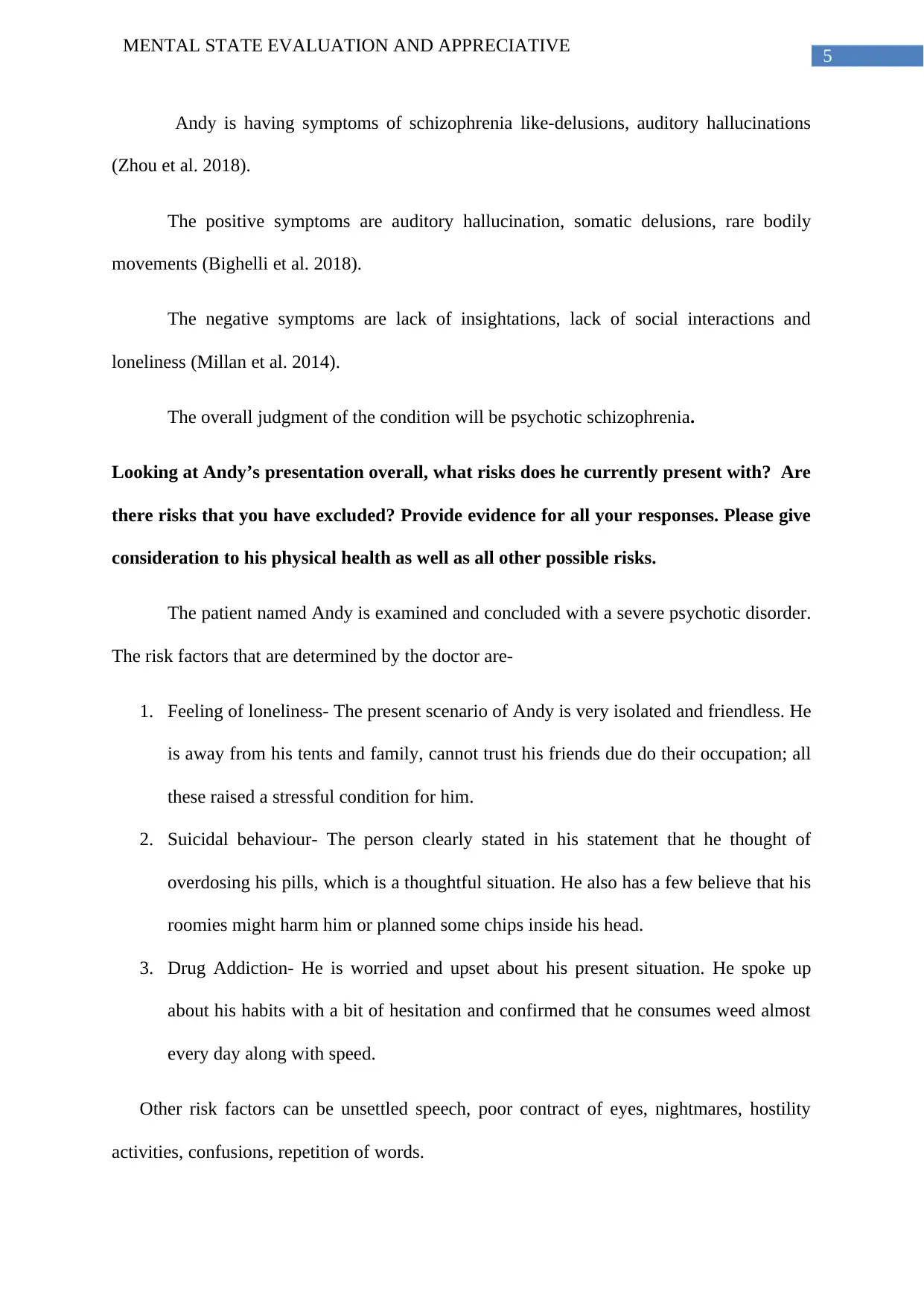
5
MENTAL STATE EVALUATION AND APPRECIATIVE
Andy is having symptoms of schizophrenia like-delusions, auditory hallucinations
(Zhou et al. 2018).
The positive symptoms are auditory hallucination, somatic delusions, rare bodily
movements (Bighelli et al. 2018).
The negative symptoms are lack of insightations, lack of social interactions and
loneliness (Millan et al. 2014).
The overall judgment of the condition will be psychotic schizophrenia.
Looking at Andy’s presentation overall, what risks does he currently present with? Are
there risks that you have excluded? Provide evidence for all your responses. Please give
consideration to his physical health as well as all other possible risks.
The patient named Andy is examined and concluded with a severe psychotic disorder.
The risk factors that are determined by the doctor are-
1. Feeling of loneliness- The present scenario of Andy is very isolated and friendless. He
is away from his tents and family, cannot trust his friends due do their occupation; all
these raised a stressful condition for him.
2. Suicidal behaviour- The person clearly stated in his statement that he thought of
overdosing his pills, which is a thoughtful situation. He also has a few believe that his
roomies might harm him or planned some chips inside his head.
3. Drug Addiction- He is worried and upset about his present situation. He spoke up
about his habits with a bit of hesitation and confirmed that he consumes weed almost
every day along with speed.
Other risk factors can be unsettled speech, poor contract of eyes, nightmares, hostility
activities, confusions, repetition of words.
MENTAL STATE EVALUATION AND APPRECIATIVE
Andy is having symptoms of schizophrenia like-delusions, auditory hallucinations
(Zhou et al. 2018).
The positive symptoms are auditory hallucination, somatic delusions, rare bodily
movements (Bighelli et al. 2018).
The negative symptoms are lack of insightations, lack of social interactions and
loneliness (Millan et al. 2014).
The overall judgment of the condition will be psychotic schizophrenia.
Looking at Andy’s presentation overall, what risks does he currently present with? Are
there risks that you have excluded? Provide evidence for all your responses. Please give
consideration to his physical health as well as all other possible risks.
The patient named Andy is examined and concluded with a severe psychotic disorder.
The risk factors that are determined by the doctor are-
1. Feeling of loneliness- The present scenario of Andy is very isolated and friendless. He
is away from his tents and family, cannot trust his friends due do their occupation; all
these raised a stressful condition for him.
2. Suicidal behaviour- The person clearly stated in his statement that he thought of
overdosing his pills, which is a thoughtful situation. He also has a few believe that his
roomies might harm him or planned some chips inside his head.
3. Drug Addiction- He is worried and upset about his present situation. He spoke up
about his habits with a bit of hesitation and confirmed that he consumes weed almost
every day along with speed.
Other risk factors can be unsettled speech, poor contract of eyes, nightmares, hostility
activities, confusions, repetition of words.
⊘ This is a preview!⊘
Do you want full access?
Subscribe today to unlock all pages.

Trusted by 1+ million students worldwide
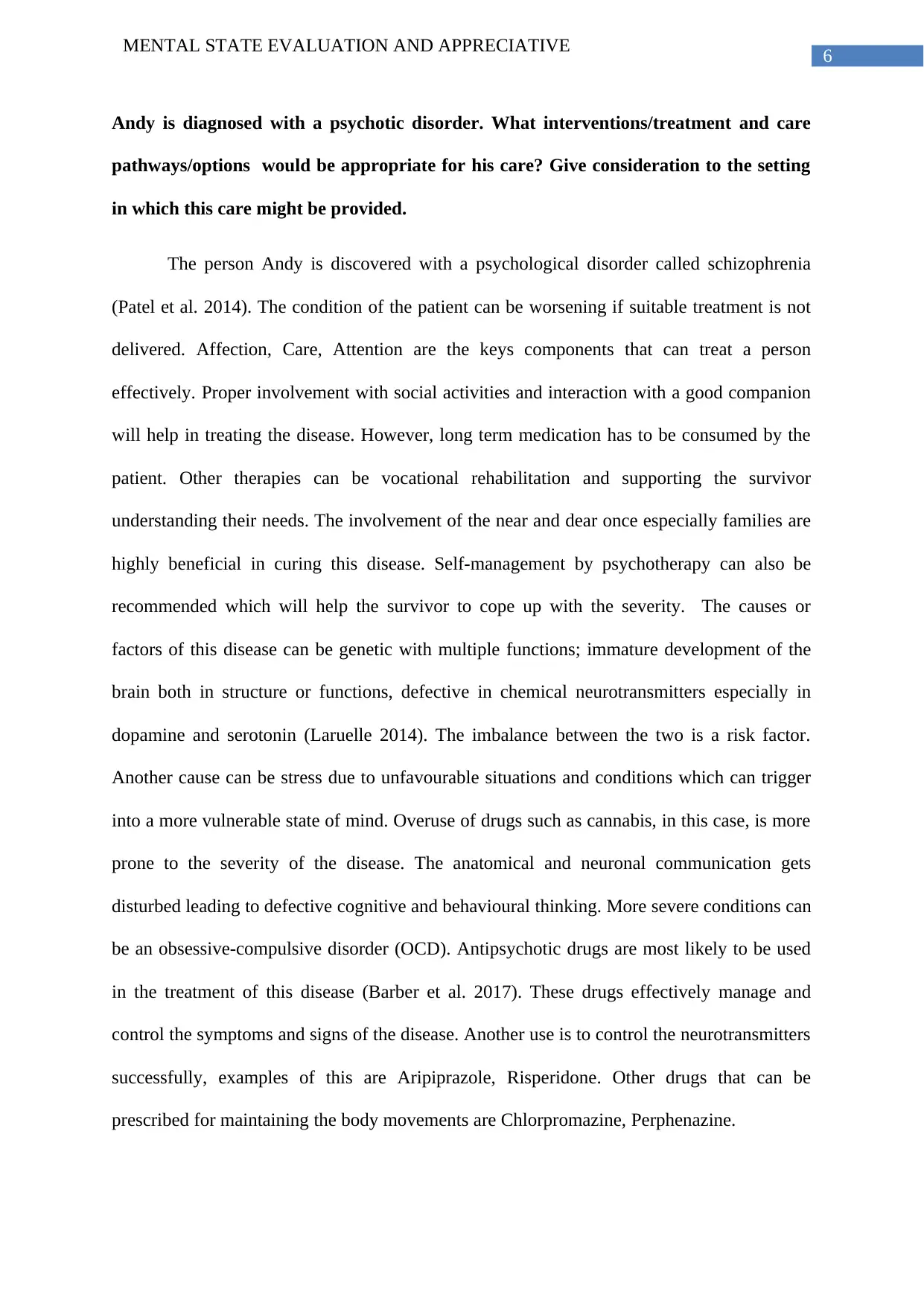
6
MENTAL STATE EVALUATION AND APPRECIATIVE
Andy is diagnosed with a psychotic disorder. What interventions/treatment and care
pathways/options would be appropriate for his care? Give consideration to the setting
in which this care might be provided.
The person Andy is discovered with a psychological disorder called schizophrenia
(Patel et al. 2014). The condition of the patient can be worsening if suitable treatment is not
delivered. Affection, Care, Attention are the keys components that can treat a person
effectively. Proper involvement with social activities and interaction with a good companion
will help in treating the disease. However, long term medication has to be consumed by the
patient. Other therapies can be vocational rehabilitation and supporting the survivor
understanding their needs. The involvement of the near and dear once especially families are
highly beneficial in curing this disease. Self-management by psychotherapy can also be
recommended which will help the survivor to cope up with the severity. The causes or
factors of this disease can be genetic with multiple functions; immature development of the
brain both in structure or functions, defective in chemical neurotransmitters especially in
dopamine and serotonin (Laruelle 2014). The imbalance between the two is a risk factor.
Another cause can be stress due to unfavourable situations and conditions which can trigger
into a more vulnerable state of mind. Overuse of drugs such as cannabis, in this case, is more
prone to the severity of the disease. The anatomical and neuronal communication gets
disturbed leading to defective cognitive and behavioural thinking. More severe conditions can
be an obsessive-compulsive disorder (OCD). Antipsychotic drugs are most likely to be used
in the treatment of this disease (Barber et al. 2017). These drugs effectively manage and
control the symptoms and signs of the disease. Another use is to control the neurotransmitters
successfully, examples of this are Aripiprazole, Risperidone. Other drugs that can be
prescribed for maintaining the body movements are Chlorpromazine, Perphenazine.
MENTAL STATE EVALUATION AND APPRECIATIVE
Andy is diagnosed with a psychotic disorder. What interventions/treatment and care
pathways/options would be appropriate for his care? Give consideration to the setting
in which this care might be provided.
The person Andy is discovered with a psychological disorder called schizophrenia
(Patel et al. 2014). The condition of the patient can be worsening if suitable treatment is not
delivered. Affection, Care, Attention are the keys components that can treat a person
effectively. Proper involvement with social activities and interaction with a good companion
will help in treating the disease. However, long term medication has to be consumed by the
patient. Other therapies can be vocational rehabilitation and supporting the survivor
understanding their needs. The involvement of the near and dear once especially families are
highly beneficial in curing this disease. Self-management by psychotherapy can also be
recommended which will help the survivor to cope up with the severity. The causes or
factors of this disease can be genetic with multiple functions; immature development of the
brain both in structure or functions, defective in chemical neurotransmitters especially in
dopamine and serotonin (Laruelle 2014). The imbalance between the two is a risk factor.
Another cause can be stress due to unfavourable situations and conditions which can trigger
into a more vulnerable state of mind. Overuse of drugs such as cannabis, in this case, is more
prone to the severity of the disease. The anatomical and neuronal communication gets
disturbed leading to defective cognitive and behavioural thinking. More severe conditions can
be an obsessive-compulsive disorder (OCD). Antipsychotic drugs are most likely to be used
in the treatment of this disease (Barber et al. 2017). These drugs effectively manage and
control the symptoms and signs of the disease. Another use is to control the neurotransmitters
successfully, examples of this are Aripiprazole, Risperidone. Other drugs that can be
prescribed for maintaining the body movements are Chlorpromazine, Perphenazine.
Paraphrase This Document
Need a fresh take? Get an instant paraphrase of this document with our AI Paraphraser
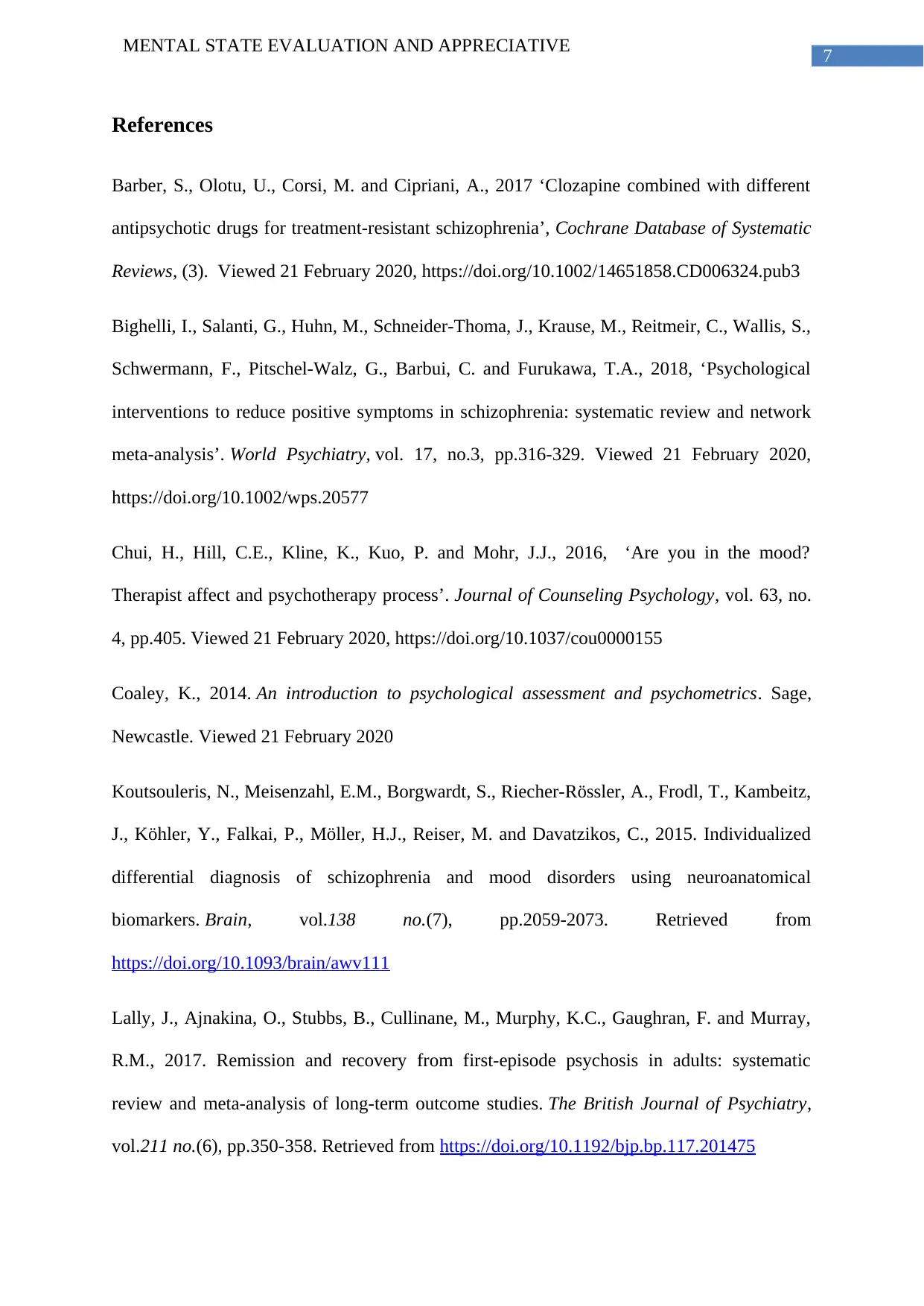
7
MENTAL STATE EVALUATION AND APPRECIATIVE
References
Barber, S., Olotu, U., Corsi, M. and Cipriani, A., 2017 ‘Clozapine combined with different
antipsychotic drugs for treatment‐resistant schizophrenia’, Cochrane Database of Systematic
Reviews, (3). Viewed 21 February 2020, https://doi.org/10.1002/14651858.CD006324.pub3
Bighelli, I., Salanti, G., Huhn, M., Schneider‐Thoma, J., Krause, M., Reitmeir, C., Wallis, S.,
Schwermann, F., Pitschel‐Walz, G., Barbui, C. and Furukawa, T.A., 2018, ‘Psychological
interventions to reduce positive symptoms in schizophrenia: systematic review and network
meta‐analysis’. World Psychiatry, vol. 17, no.3, pp.316-329. Viewed 21 February 2020,
https://doi.org/10.1002/wps.20577
Chui, H., Hill, C.E., Kline, K., Kuo, P. and Mohr, J.J., 2016, ‘Are you in the mood?
Therapist affect and psychotherapy process’. Journal of Counseling Psychology, vol. 63, no.
4, pp.405. Viewed 21 February 2020, https://doi.org/10.1037/cou0000155
Coaley, K., 2014. An introduction to psychological assessment and psychometrics. Sage,
Newcastle. Viewed 21 February 2020
Koutsouleris, N., Meisenzahl, E.M., Borgwardt, S., Riecher-Rössler, A., Frodl, T., Kambeitz,
J., Köhler, Y., Falkai, P., Möller, H.J., Reiser, M. and Davatzikos, C., 2015. Individualized
differential diagnosis of schizophrenia and mood disorders using neuroanatomical
biomarkers. Brain, vol.138 no.(7), pp.2059-2073. Retrieved from
https://doi.org/10.1093/brain/awv111
Lally, J., Ajnakina, O., Stubbs, B., Cullinane, M., Murphy, K.C., Gaughran, F. and Murray,
R.M., 2017. Remission and recovery from first-episode psychosis in adults: systematic
review and meta-analysis of long-term outcome studies. The British Journal of Psychiatry,
vol.211 no.(6), pp.350-358. Retrieved from https://doi.org/10.1192/bjp.bp.117.201475
MENTAL STATE EVALUATION AND APPRECIATIVE
References
Barber, S., Olotu, U., Corsi, M. and Cipriani, A., 2017 ‘Clozapine combined with different
antipsychotic drugs for treatment‐resistant schizophrenia’, Cochrane Database of Systematic
Reviews, (3). Viewed 21 February 2020, https://doi.org/10.1002/14651858.CD006324.pub3
Bighelli, I., Salanti, G., Huhn, M., Schneider‐Thoma, J., Krause, M., Reitmeir, C., Wallis, S.,
Schwermann, F., Pitschel‐Walz, G., Barbui, C. and Furukawa, T.A., 2018, ‘Psychological
interventions to reduce positive symptoms in schizophrenia: systematic review and network
meta‐analysis’. World Psychiatry, vol. 17, no.3, pp.316-329. Viewed 21 February 2020,
https://doi.org/10.1002/wps.20577
Chui, H., Hill, C.E., Kline, K., Kuo, P. and Mohr, J.J., 2016, ‘Are you in the mood?
Therapist affect and psychotherapy process’. Journal of Counseling Psychology, vol. 63, no.
4, pp.405. Viewed 21 February 2020, https://doi.org/10.1037/cou0000155
Coaley, K., 2014. An introduction to psychological assessment and psychometrics. Sage,
Newcastle. Viewed 21 February 2020
Koutsouleris, N., Meisenzahl, E.M., Borgwardt, S., Riecher-Rössler, A., Frodl, T., Kambeitz,
J., Köhler, Y., Falkai, P., Möller, H.J., Reiser, M. and Davatzikos, C., 2015. Individualized
differential diagnosis of schizophrenia and mood disorders using neuroanatomical
biomarkers. Brain, vol.138 no.(7), pp.2059-2073. Retrieved from
https://doi.org/10.1093/brain/awv111
Lally, J., Ajnakina, O., Stubbs, B., Cullinane, M., Murphy, K.C., Gaughran, F. and Murray,
R.M., 2017. Remission and recovery from first-episode psychosis in adults: systematic
review and meta-analysis of long-term outcome studies. The British Journal of Psychiatry,
vol.211 no.(6), pp.350-358. Retrieved from https://doi.org/10.1192/bjp.bp.117.201475
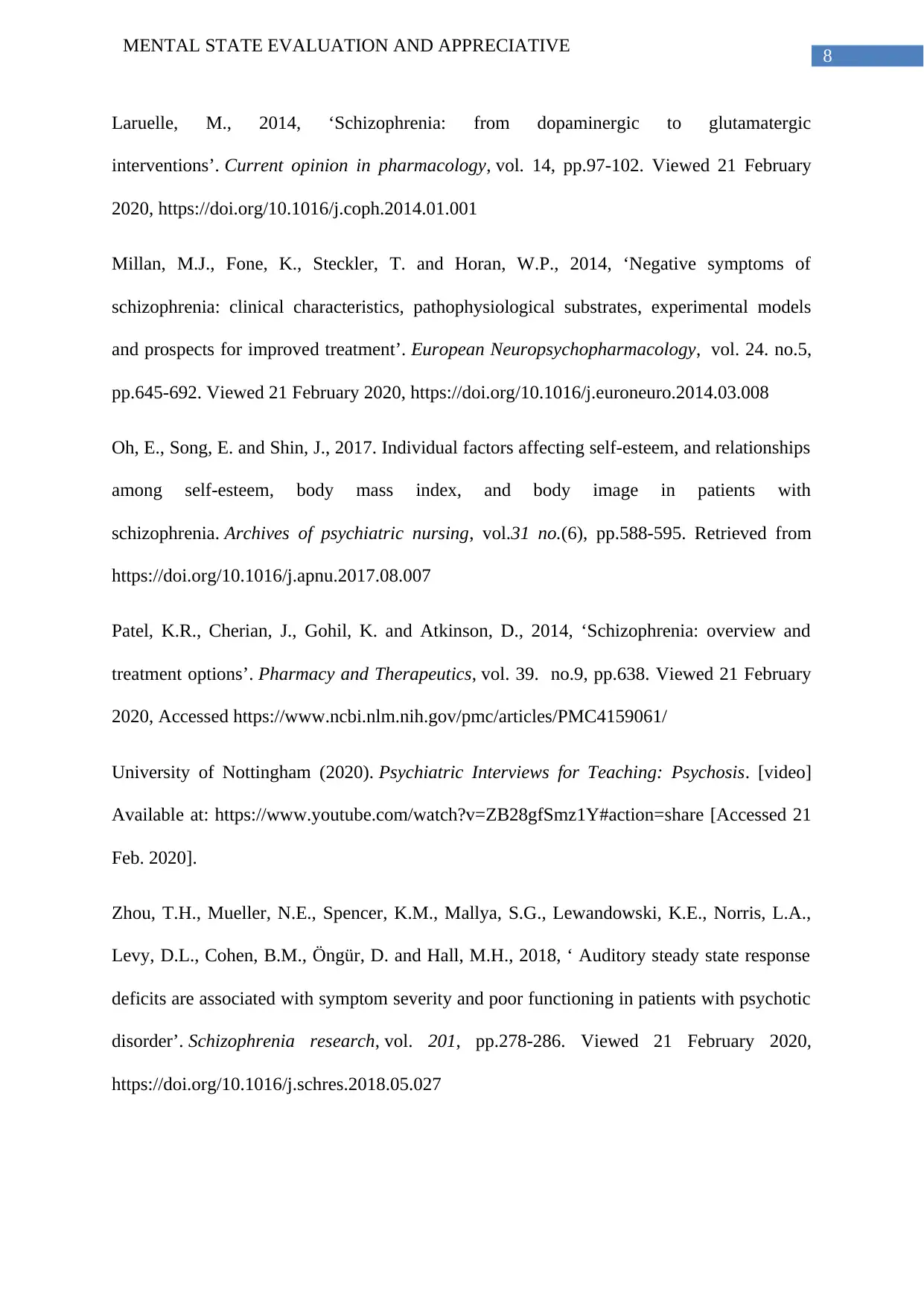
8
MENTAL STATE EVALUATION AND APPRECIATIVE
Laruelle, M., 2014, ‘Schizophrenia: from dopaminergic to glutamatergic
interventions’. Current opinion in pharmacology, vol. 14, pp.97-102. Viewed 21 February
2020, https://doi.org/10.1016/j.coph.2014.01.001
Millan, M.J., Fone, K., Steckler, T. and Horan, W.P., 2014, ‘Negative symptoms of
schizophrenia: clinical characteristics, pathophysiological substrates, experimental models
and prospects for improved treatment’. European Neuropsychopharmacology, vol. 24. no.5,
pp.645-692. Viewed 21 February 2020, https://doi.org/10.1016/j.euroneuro.2014.03.008
Oh, E., Song, E. and Shin, J., 2017. Individual factors affecting self-esteem, and relationships
among self-esteem, body mass index, and body image in patients with
schizophrenia. Archives of psychiatric nursing, vol.31 no.(6), pp.588-595. Retrieved from
https://doi.org/10.1016/j.apnu.2017.08.007
Patel, K.R., Cherian, J., Gohil, K. and Atkinson, D., 2014, ‘Schizophrenia: overview and
treatment options’. Pharmacy and Therapeutics, vol. 39. no.9, pp.638. Viewed 21 February
2020, Accessed https://www.ncbi.nlm.nih.gov/pmc/articles/PMC4159061/
University of Nottingham (2020). Psychiatric Interviews for Teaching: Psychosis. [video]
Available at: https://www.youtube.com/watch?v=ZB28gfSmz1Y#action=share [Accessed 21
Feb. 2020].
Zhou, T.H., Mueller, N.E., Spencer, K.M., Mallya, S.G., Lewandowski, K.E., Norris, L.A.,
Levy, D.L., Cohen, B.M., Öngür, D. and Hall, M.H., 2018, ‘ Auditory steady state response
deficits are associated with symptom severity and poor functioning in patients with psychotic
disorder’. Schizophrenia research, vol. 201, pp.278-286. Viewed 21 February 2020,
https://doi.org/10.1016/j.schres.2018.05.027
MENTAL STATE EVALUATION AND APPRECIATIVE
Laruelle, M., 2014, ‘Schizophrenia: from dopaminergic to glutamatergic
interventions’. Current opinion in pharmacology, vol. 14, pp.97-102. Viewed 21 February
2020, https://doi.org/10.1016/j.coph.2014.01.001
Millan, M.J., Fone, K., Steckler, T. and Horan, W.P., 2014, ‘Negative symptoms of
schizophrenia: clinical characteristics, pathophysiological substrates, experimental models
and prospects for improved treatment’. European Neuropsychopharmacology, vol. 24. no.5,
pp.645-692. Viewed 21 February 2020, https://doi.org/10.1016/j.euroneuro.2014.03.008
Oh, E., Song, E. and Shin, J., 2017. Individual factors affecting self-esteem, and relationships
among self-esteem, body mass index, and body image in patients with
schizophrenia. Archives of psychiatric nursing, vol.31 no.(6), pp.588-595. Retrieved from
https://doi.org/10.1016/j.apnu.2017.08.007
Patel, K.R., Cherian, J., Gohil, K. and Atkinson, D., 2014, ‘Schizophrenia: overview and
treatment options’. Pharmacy and Therapeutics, vol. 39. no.9, pp.638. Viewed 21 February
2020, Accessed https://www.ncbi.nlm.nih.gov/pmc/articles/PMC4159061/
University of Nottingham (2020). Psychiatric Interviews for Teaching: Psychosis. [video]
Available at: https://www.youtube.com/watch?v=ZB28gfSmz1Y#action=share [Accessed 21
Feb. 2020].
Zhou, T.H., Mueller, N.E., Spencer, K.M., Mallya, S.G., Lewandowski, K.E., Norris, L.A.,
Levy, D.L., Cohen, B.M., Öngür, D. and Hall, M.H., 2018, ‘ Auditory steady state response
deficits are associated with symptom severity and poor functioning in patients with psychotic
disorder’. Schizophrenia research, vol. 201, pp.278-286. Viewed 21 February 2020,
https://doi.org/10.1016/j.schres.2018.05.027
⊘ This is a preview!⊘
Do you want full access?
Subscribe today to unlock all pages.

Trusted by 1+ million students worldwide

9
MENTAL STATE EVALUATION AND APPRECIATIVE
MENTAL STATE EVALUATION AND APPRECIATIVE
1 out of 10
Related Documents
Your All-in-One AI-Powered Toolkit for Academic Success.
+13062052269
info@desklib.com
Available 24*7 on WhatsApp / Email
![[object Object]](/_next/static/media/star-bottom.7253800d.svg)
Unlock your academic potential
Copyright © 2020–2025 A2Z Services. All Rights Reserved. Developed and managed by ZUCOL.





